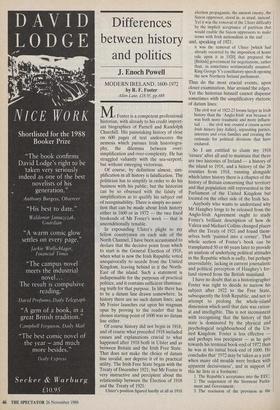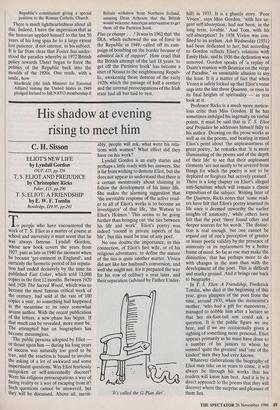Differences between history and politics
J. Enoch Powell
MODERN IRELAND, 1600-1972 by R. F. Foster
Allen Lane, £18.95, pp.688
M r Foster is a competent professional historian, with already to his credit import- ant biographies of Parnell and Randolph Churchill. His painstaking history of close on 600 pages of text underscores the nemesis which pursues Irish historiogra- phy, the dilemma between over- simplification and over-complexity. He has struggled valiantly with the sea-serpent, but without emerging victorious.
Of course, by definition almost, sim- plification in all history is falsification. The politician has to simplify in order to do his business with his public; but the historian can be so obsessed with the falsity of simplification as to qualify his subject out of recognisability. There is simply no asser- tion that can be made about Irish history either in 1600 or in 1972 — the two fixed bookends of Mr Foster's work — that is unconditionally tenable.
In expounding Ulster's plight to my fellow countrymen on each side of the North Channel, I have been accustomed to declare that the decisive point from which to start is the General Election of 1918, when what is now the Irish Republic voted unequivocally to secede from the United Kingdom, leaving behind in it the North- East of the island. Such a statement is indispensable for the purposes of practical politics, and it contains sufficient illuminat- ing truth for that purpose. In life there has to be a datum line drawn somewhere. In history there are no such datum lines; and Mr Foster launches out upon his magnum opus by proving to the reader that his chosen starting-point of 1600 was no datum line either.
Of course history did not begin in 1918, and of course what preceded 1918 included causes and explanations crucial to what happened after 1918 both in Ulster and as between Britain and the Irish Free State. That does not make the choice of datum line invalid, nor deprive it of its practical utility. The Irish Free State began with the Treaty of December 1921; but Mr Foster is very instructive and percipient about the relationship between the Election of 1918 and the Treaty of 1921:
Ulster's position figured hardly at all in 1918 election propaganda; the ancient enemy, the Saxon oppressor, stood in, as usual, instead. Yet it was the removal of the Ulster difficulty by the implicit acceptance of partition that would enable the Saxon oppressors to make terms with Irish nationalism in the end . . .
and, speaking of 1921,
it was the removal of Ulster [which had already occurred by the imposition of home rule upon it in 1920] that prepared the [British] government for negotiations, rather than, as sometimes sentimentally assumed, King George V's conciliatory speech opening the new Northern Ireland parliament.
Thus do the most crucial events, upon closer examination, blur around the edges. Yet the historian himself cannot dispense sometimes with the simplificatory rhetoric of datum lines: The civil war of 1922-23 looms larger in Irish history than the 'Anglo-Irish' war because it was both more traumatic and more influen- tial . . . the civil war created a cesura across Irish history [my italics], separating parties, interests and even families and creating the rationale for political divisions that have endured.
So I am entitled to claim my 1918 `cesura' after all and to maintain that there are two histories of Ireland — a history of the island to 1918, and a history of the 26 counties from 1918, running alongside which latter history there is a chapter of the history of Britain concerning that territory and that population still represented in the Parliament of the United Kingdom but located on the other side of the Irish Sea.
Anybody who wants to understand why Mr Haughey longs to be released from the Anglo-Irish Agreement ought to study Foster's brilliant description of how de Valera and Michael Collins changed places after the Treaty of 1921 and found them- selves both 'painted into a corner'. That whole section of Foster's book can be transplanted 50 or 60 years later to provide an analysis of underlying political attitudes in the Republic which is sadly, but perhaps unavoidably, lacking in current journalistic and political perception of Haughey's Ire- land viewed from the British mainland.
I have no doubt that as a historiographer Foster was right to decide to narrow his subject after 1922 to the Free State, subsequently the Irish Republic, and not to attempt to prolong the whole-island dimension which until that date was ration- al and intelligible. This is not inconsistent with recognising that the history of that state is dominated by the physical and psychological neighbourhood of the Un- ited Kingdom. Foster is less effective and perhaps less percipient — as he gets towards his terminal book-end of 1972 than he was at his initial book-end of 1600. He concludes that '1972 may be taken as a year when many old moulds were broken with apparent decisiveness', and in support of this he lists in a footnote:
1. The Republic's acceptance into the EEC; 2. The suspension of the Stormont Parlia- ment and Government; 3. The rescission of the provision in the Republic's constitution giving a special position to the Roman Catholic Church.
There is much lightheartedness about all this. Indeed, I have the impression that as the historian applied himself to the last 50 years of his long span he to a large extent lost patience, if not interest, in his subject. It is far from clear that Foster has under- stood the paradox whereby in 1972 British policy towards Ulster began to force the politics of the Republic back into the moulds of the 1920s. One reads, with a smile, how
MacBride [the Irish Minister for External Affairs] visiting the United States in 1949 pledged Ireland to full NATO membership if Britain withdrew from Northern Ireland, assuring Dean Acheson that the British would welcome American intervention to get them off the Partition hook.
Plus fa change . . .! It was in 1962 that 'the IRA, which eschewed the use of force in the Republic in 1949, called off its cam- paign of bombing on the border because of admitted lack of support'. How cruel that the British attempt of the last 18 years `to get off the Partition hook' has become a shirt of Nessus to the neighbouring Repub- lic, awakening those demons of the early 1920s which the passage of half a century and the internal preoccupations of the Irish state had all but laid to rest.











































































 Previous page
Previous page